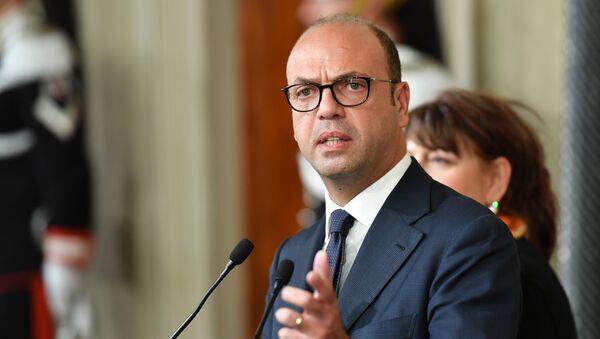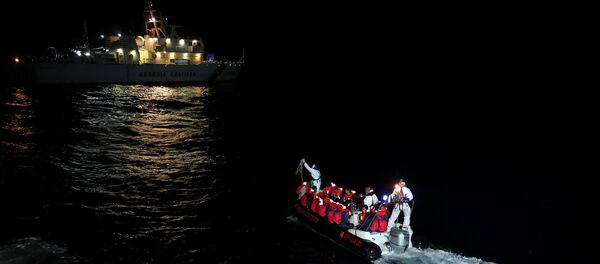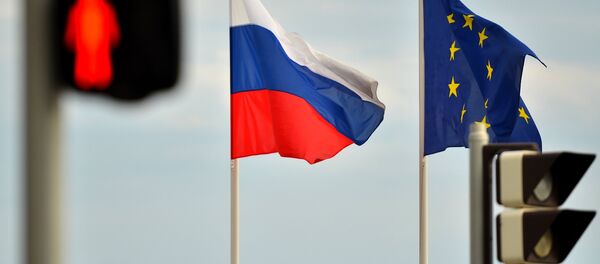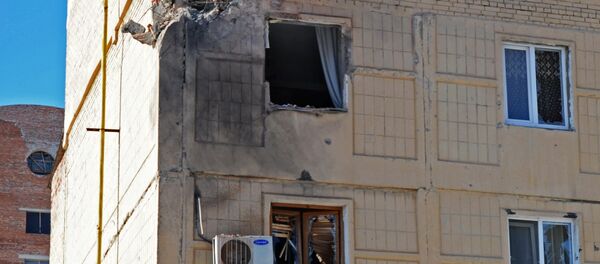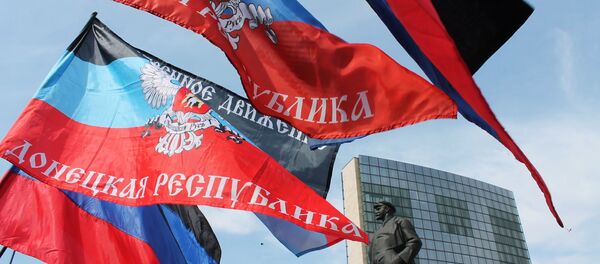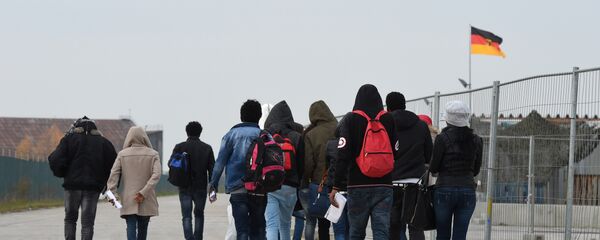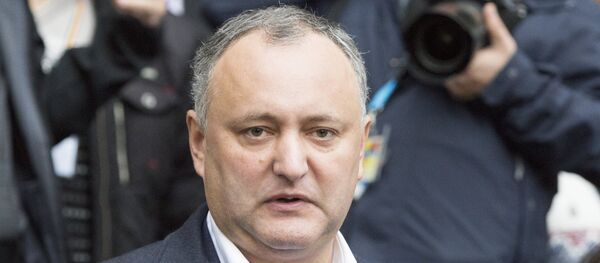On Situation in Lybia
Russia and Italy have a common view on settlement of the ongoing crisis in Libya, which is based on political settlement of the situation,Italy's foreign minister said.
"The recent long and friendly conversation between Prime Minister Gentiloni and President Putin on the Libyan dossier and a significant coincidence of views that has been shown during the talks are the confirmation of a common view based on the intention to contribute to the political and peaceful settlement of the Libyan crisis," Alfano said.
The Italian official said that the activities of Rome and Moscow were based on the support of UN envoy to Libya Ghassan Salame's activities and of the institutions envisaged by the Libyan Political Agreement reached in Morocco's Skhirat.
READ MORE: Italy Accepts First Migrants Via 'Humanitarian Corridor' From Libya
According to the diplomat, Italy's cooperation with Russia on Libya is very productive.
"I believe that 2018 could be the final year of a long transition in Libya, and it should be achieved via the election process as envisaged by professor Salame's plan of actions. However, we know that we should respond to quite numerous challenges and firm and consolidated support of the international community, especially of Rome and Moscow, should have the pivotal role," Alfano said.
Libya has been suffering from a civil war since 2011. Two rival governments are struggling for control over the country. Libya's eastern regions are governed by the parliament headquartered in the city of Tobruk, which cooperates with Haftar's forces. The Government of National Accord, formed with the support from the United Nations and Europe, operates in the country’s west, including in the Libyan capital of Tripoli.
On Anti-Russia Sanctions
The possibility of lifting the anti-Russia sanctions of the European Union is closely linked to the implementation of the Minsk agreements on the settlement of the situation in Ukraine, Angelino Alfano pointed out.
At the same time, the politician pointed out that the extension of anti-Russia sanctions can not be automatic.
READ MORE: 'Road to Nowhere': Russian Ambassador to US Sees no Intimidation Over Sanctions
"For our part, we remain convinced that the extension of sanctions can not be automatic, but should always follow an in-depth political discussion," he said.
Alfano noted that the situation around Crimea remains an "open wound" in relations with Russia, adding that does not "foresee significant changes in the individual and sectoral restrictive measures related to the" issue.
Recently, politicians and businessmen of a number of EU countries, including Italy, have been increasingly vocal in their appeals to lift sanctions against Russia.
On Settlement of Ukrainian Crisis
Efforts aimed at settlement of the Ukrainian crisis is a key priority for the Organization for Security and Co‑operation in Europe (OSCE) during Italy's chairmanship of the organization in 2018, Alfano told Sputnik.
"During our chairmanship, we will focus on the Ukrainian crisis as well as the so-called long-lasting conflicts in the OSCE zone [Nagorno-Karabakh, Transnistria, Georgia]. Looking for the ways to settle the Ukrainian crisis will be a priority task," Alfano said.
READ MORE: OSCE's E Ukraine Chief Monitor Calls for Ceasefire in Donbass
Alfano said that he would visit start a two-day visit to Ukraine on Tuesday where he would meet with the country's foreign minister, Pavlo Klimkin, and would later visit Russia to meet Russian Foreign Minister Sergey Lavrov.
"The OSCE is doing a lot in order to settle the crisis through the Special Monitoring Mission [SMM OSCE], the Observer Mission at the Checkpoints Gukovo and Donetsk as well as structured mediation activities as part of the Trilateral Contact Group," Alfano said, adding that as the OSCE chairman he should give boost to these formats that work in coordination with the Normandy Four Group.
READ MORE: Kremlin on Peacekeepers' Deployment to E Ukraine: Russia Not a Side of Conflict
"The settlement of the crisis cannot be found in Vienna or in Rome, but it is in the political will of the concerned parties to come to a real compromise," the Italian minister said, adding that the divisive steps that could push the parties to the conflict to adopt tougher positions should be avoided.
The OSCE SMM to Ukraine was deployed in March 2014 to observe and report on the situation in the country's southeast, where Kiev forces had been clashing with local militias.
On EU Migration Problem
Italy's approach to the solution of the acute migration problem consists of combining principles of security and solidarity supported by sufficient investments, the Italian minister of foreign affairs said.
"Our approach links security and solidarity so as to provide adequate protection for migrants, especially for the most vulnerable, while at the same time tackling the underlying causes of migration. So we increased the funds to stimulate development by sending 180 million euros [$222 million] for the needs of the African continent last year. In the same year of 2017, we transferred substantial resources to African countries through Africa Fund for projects aimed at placing bets on development opportunities in local communities affected by the phenomenon of migration," Alfano said.
READ MORE: Europe May Need 10-20 Years to Solve Migration Crisis — Italian Prime Minister
The politician also stressed that the Italian government had proposed to use this approach to the EU leadership first through a Migration Compact non-paper in April 2016, and then as pilot projects for some countries in western and eastern Africa.
"We worked hard to adopt the EU External Investment Plan, which could stimulate a significant flow of investment (mostly private) to various sectors of the African economy," he said.
According to Alfano, it is about "providing the contingent of Niger with a maximum of 470 people for training and assistance to the Nigerian armed forces involved in countering terrorism and illegal trade, including human trafficking."
However, the final composition of the contingent will be resolved in coordination with the Nigerian authorities on the basis of their needs, and as a result, the presence could average about 250 people, the minister concluded.
READ MORE: Davos Panel on Migration Crisis Shows EU Lacks Common Strategy
Europe is going through the most serious migration crisis since the Second World War, caused, first of all, by a number of armed conflicts and economic problems in the countries of Africa and the Middle East. Greece and Italy have been particularly overwhelmed with the migrant crisis as they often serve as the arrival points for refugees.
On Transnistrian Settlement
Angelino Alfano stressed that he would discuss with his colleagues in Kiev and Moscow the course of negotiations on the Transnistrian settlement, which he considers promising.
"Talks on stabilization in Transnistria are promising, and a certain progress was made in 2017. Russia and Ukraine are cooperating in a constructive way, and this is encouraging. As the OSCE chair, I will talk about this with Minister [of Foreign Affairs of Ukraine Pavlo] Klimkin, and with Minister [of Foreign Affairs of Russia Sergey] Lavrov," the Italian diplomat said.
In January, Alfano announced that former Italian Foreign Minister and former Vice-President of the European Commission Franco Frattini would fulfill the duties of the Special Representative of the OSCE Chairperson-in-Office for the Transdniestrian Settlement Process in 2018.
READ MORE: Moscow Ready to Remove Munitions From Transnistria — Deputy Foreign Minister
"It is because I am convinced of the importance of this dossier, I decided to entrust it to Franco Frattini, whose competence and experience in the field of international politics are not questionable. He is preparing to meet with the parties and negotiators in order to determine the following negotiating stages, beginning with a possible agreement on the cars' license plates," Alfano said.
In early January, Frattini expressed his confidence that Russia's contribution to the Transnistrian settlement would remain the most important ones, without which it is impossible to reach a reconciliation agreement. In this regard, he expressed the hope that he would soon have phone conversations and direct contacts with Russian representatives, including with Lavrov, whom he called his friend.
Transnistria, a region which has a predominantly ethic Russian and Ukrainian population, seceded from the Soviet Republic of Moldova in 1990. The separation led to a conflict that ended in a ceasefire announced on July 21, 1992, but the conflict remains unresolved.
Since 2005, the talks on the conflict in Transnistria have been held in the 5+2 format that includes the breakaway region, Moldova, the OSCE, Russia, Ukraine, plus the European Union and the United States as external observers. The previous round of talks was carried out in June 2016 in Berlin.

